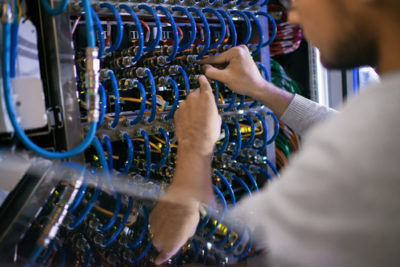
Photo: Shutterstock/By SeventyFour
As we head into the biggest supercomputing event of the year, all eyes are on exascale. The frontrunners in the race to exascale, including our friends over at Altair, will convene at SC19 in Denver this November to share updates, address challenges, and help paint the picture of an exascale-fueled future for HPC.
You can witness a meeting of the minds as Argonne National Laboratory’s Bill Allcock and Altair PBS Works™ CTO Bill Nitzberg host a live Q&A on exascale scheduling in Altair booth #1319 on Tuesday, Nov. 19. They’ll cover the promises and challenges of exascale computing, how we’re getting there, and what will happen once we’ve achieved exascale capabilities. They’ll also field questions from the audience.
Quintillions of Calculations
Not a billion, or a trillion, or even a quadrillion … HPC will soon be capable of a quintillion calculations per second, and that will have a profound impact on what’s possible with HPC.
Exascale computing will require:
- Hardware that meets higher performance standards and uses less power
- Highly parallelized software as computing moves beyond Moore’s Law
- Fault-tolerant systems with no single-node dependence
- The best in workload and resource management to make it possible
HPC resource managers will need to perform dynamic scheduling and assign computing jobs as quickly and efficiently as possible to make full use of exascale capability. HPC management suites like PBS Works will need to use advanced, leading-edge techniques, like machine learning, to better predict optimal resource orchestration at exascale.
I believe HPC improves people’s lives — making us safer, making us smarter, and making the world more sustainable, more accessible, and, frankly, more fun,” said Bill Nitzberg, CTO for PBS Works at Altair. “At Altair, we build tools to access, optimize, and control HPC, not only for today, but also focused on exascale, the next generation of HPC.”
Industries like automotive and aerospace manufacturing, heavy equipment, and high-end electronics need multiple physics-based solvers — including structural optimization, electromagnetics, and computational fluid dynamics (CFD) solvers — to predict performance. Today’s simulations have hefty time and compute requirements, and they enable organizations to make better decisions and help get products to market faster.
Exascale Demands: Scale, Speed, Resilience & Security
Getting to exascale requires speed and scale, with millions of operations instead of thousands. It requires extreme resilience and the ability to continuously recover from faults. Power management is a critical consideration for any high-performance computing system and will be even more so for exascale. The power required to run an exascale-class system is significant. Hardware will be heterogeneous, including GPUs, SSDs, and possibly even the cloud. Exascale systems and their software ecosystems need to be extensible and be packaged with a good user experience. UX is important, especially for administration, to help with visibility, automation, and prescriptive analytics.
Our road to exascale and beyond includes:
- Altair Accelerator™ Plus for 6-10x greater throughput
- PMIx for fast launch of huge MPI jobs
- Active-active PBS Professional™ server
- Green Provisioning™
- Hybrid cloud bursting, ARM64, GPUs, and SSDs
- Dual-licensed PBS Professional with extensive plugin framework
- Altair Control™ for monitoring, analytics and simulation
- Security focus
Going Big
PBS Works runs big — 50,000 nodes in one cluster, 10,000,000 jobs in a queue, and 1,000 concurrent active users. It runs fast — 10,000,000 jobs per hour end-to-end throughput and 10-second end-to-end run for a single 4,000+ node job. It recovers from faults without losing work and is ICD 503-certified with Red Hat Enterprise Linux MLS. Some of the biggest computing systems in the world use Altair PBS Works, including those leading the race to exascale, and we’re helping shape the US exascale ecosystem as a member of the DOE’s Exascale Computing Project (ECP) Industry Council.
Exascale will have widespread implications in industries from manufacturing to personalized medicine, and we’re depending on it in order to stay at the forefront of innovation.
Don’t miss “Exascale Q&A: Job Scheduling and Workload Management for the World’s Largest Supercomputers” at the Altair booth theater on Tuesday during SC19.



